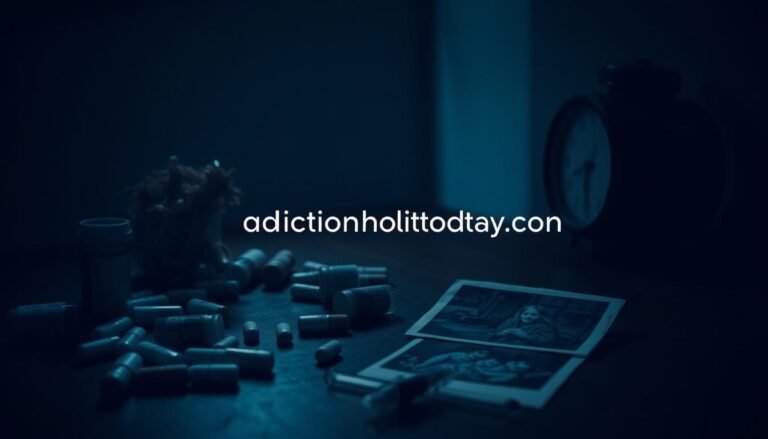How Sharing Your Addiction Letter Can Help Others
Have you ever wondered how one person’s story could change another’s life? Addiction is a complex disease that affects millions, yet many feel isolated in their struggles. Sharing your journey through an addiction letter can be a powerful step toward healing—not just for you, but for others too.
Writing about your experiences with substance abuse or alcohol addiction can help you reflect on your recovery journey. It also offers hope and guidance to those who feel lost. When you share your story, you create a connection that reminds others they’re not alone.
Resources like Addiction Hotline Today and James Haggerty Recovery highlight the importance of authenticity in recovery. Your letter can inspire someone to take their first step toward treatment or strengthen their resolve to stay sober.
Key Takeaways
- Sharing your story can inspire others to seek help.
- Writing an addiction letter helps you reflect on your journey.
- Authenticity fosters a supportive community.
- Peer support increases the chances of long-term sobriety.
- Every story matters and can make a difference.
Understanding the Power of Personal Recovery Stories
Every journey through addiction carries a unique message of hope and resilience. Personal recovery stories are more than just narratives—they are blueprints for overcoming challenges and finding strength in vulnerability. These stories remind us that no one is alone in their struggle and that healing is possible.
The Role of Honesty and Vulnerability
Being honest about your addiction and recovery journey is a powerful act. It allows others to see the real, unfiltered process of healing. Vulnerability builds trust and creates a safe space for others to share their own experiences. As one AA member shared, “When I opened up about my struggles, I realized I wasn’t just helping myself—I was helping others too.”
Sharing intimate details of your journey can help dispel the stigma surrounding substance abuse. It shows that addiction is a disease, not a moral failing. This honesty fosters empathy and encourages others to seek tailored treatment plans that address their unique needs.
Connecting Through Shared Experiences
Structured group settings, like AA meetings, thrive on shared feelings and empathy. When individuals share their stories, they create a sense of community. This connection reduces feelings of isolation and strengthens the resolve to stay sober.
Balancing candidness with sensitivity is key. Your story should inspire, not overwhelm. By focusing on both struggles and successes, you offer a relatable narrative that others can learn from. Every recovery story is unique, but they all carry a message of hope and practical advice.
Crafting a Meaningful Addiction Letter
Crafting an addiction letter can be a transformative experience for both the writer and the reader. It’s a chance to reflect on your recovery journey while offering hope and guidance to others. A well-written letter can inspire change, foster connections, and remind everyone that healing is possible.
Identifying Key Moments in Your Journey
Start by reflecting on pivotal moments in your addiction and recovery. These could be turning points, challenges, or triumphs. Think about how these moments shaped your path and what lessons they taught you. Writing them down helps create a clear narrative.
For example, consider the first time you sought treatment or the support you received from a loved one. These details add depth and authenticity to your letter. They also make your story relatable to others who may be going through similar struggles.
Tips for Authentic Storytelling
Authenticity is key when writing an addiction letter. Be honest about your experiences, but also focus on the positive changes you’ve made. Here are some tips to help you craft a compelling letter:
| Tip | Description |
|---|---|
| Be Specific | Include concrete details about your journey, such as dates, places, or significant events. |
| Balance Emotion and Fact | Share your feelings, but also provide factual information about your recovery process. |
| Use Structured Storytelling | Organize your letter chronologically or thematically to maintain coherence. |
| Highlight Growth | Focus on how you’ve changed and what steps you’ve taken to improve your mental health. |
| End with Hope | Conclude your letter on a positive note, emphasizing the possibility of healing and a brighter future. |
By following these tips, you can create a letter that not only reflects your journey but also inspires others to take their first step toward recovery. Remember, your story has the power to make a difference.
how-sharing-your-addiction-letter-can-help-others
Your story has the power to ignite change in someone else’s life. When you share your addiction letter, you create a ripple effect that can inspire others to confront their struggles. Your words can be the spark that encourages someone to seek treatment or stay committed to their recovery journey.

Empowering Others with Your Experience
Sharing your story isn’t just about recounting your past—it’s about offering hope. Research shows that 50% of people in recovery say sharing their experiences helps them feel less alone. Your letter can remind others that they’re not the only ones fighting this battle.
Consider this example: A man shared his addiction letter in a support group. One member, who had been hesitant to seek help, later said, “Hearing his story gave me the courage to take my first step toward treatment.” This is the power of shared experiences.
Building a Community of Resilience
When you open up about your journey, you contribute to a community of understanding. Studies indicate that 75% of individuals entering treatment feel isolated. Your letter can bridge that gap, offering both empathy and practical advice.
“Sharing my story wasn’t just about me—it was about showing others that recovery is possible.”
Here are some ways to make your letter impactful:
- Be Honest: Share both your struggles and breakthroughs to paint a complete picture.
- Invite Empathy: Frame your experiences in a way that resonates with diverse audiences.
- End with Hope: Conclude your letter by emphasizing the possibility of healing.
Your letter can leave a lasting legacy. Long after it’s shared, it may continue to inspire others to take their first step toward recovery. Remember, your story matters—it has the power to change lives.
Leveraging Support Resources and Timely Information
In the ever-changing world of addiction recovery, staying informed is key to success. Access to reliable resources can make all the difference in the process of healing. Whether you’re seeking treatment for yourself or supporting a loved one, leveraging trusted platforms ensures you’re equipped with the latest tools and knowledge.

Exploring Trusted Online Platforms
Websites like addictionhotlinetoday.com, habitrecovery.com, and rehabme.org are invaluable for anyone navigating the complexities of addiction. These platforms offer up-to-date information, professional advice, and community support. For example, this resource highlights the connection between prescription drug addiction and mental health, emphasizing the need for integrated care.
Here’s how these platforms can help:
- Provide access to the latest treatment methods and research.
- Offer tools for managing triggers and maintaining sobriety.
- Connect individuals with peer networks and professional counselors.
Staying Current with Evolving Practices
The field of addiction rehabilitation is constantly evolving. New therapies, medications, and strategies are emerging to improve outcomes. Staying informed about these advancements ensures you’re making the best decisions for your recovery journey.
For instance, quick access to resources like naloxone distribution programs has been shown to significantly reduce overdose deaths. Similarly, digital literacy and proactive research can help you adapt to the changing landscape of treatment.
| Resource | Key Features |
|---|---|
| addictionhotlinetoday.com | Comprehensive guides, hotline support, and treatment options. |
| habitrecovery.com | Tools for relapse prevention and community forums. |
| rehabme.org | Access to professional advice and recovery programs. |
By leveraging these platforms, you can stay informed, connected, and empowered throughout your recovery. Remember, the right resources can make all the difference in achieving long-term sobriety.
Incorporating Intervention Strategies and Family Involvement
Intervention strategies can be a turning point in the fight against addiction. When a loved one is struggling, family involvement becomes crucial. An intervention letter can serve as a powerful tool to express concern, set boundaries, and encourage treatment.
Using Intervention Letters to Spark Change
An intervention letter is often the first step in helping someone recognize the impact of their addiction. It allows family members to communicate their feelings in a structured and compassionate way. Here’s how to craft an effective letter:
- Express Concern: Share specific examples of how their behavior has affected you and others.
- Set Boundaries: Clearly state what actions you will take if they refuse to seek help.
- Offer Support: Provide information about treatment options and resources.
For example, a well-written letter might include phrases like, “We love you and want to see you healthy,” while also emphasizing the need for immediate action. This balance of empathy and accountability can motivate someone to take the first step toward recovery.
Balancing Compassion with Necessary Boundaries
Family members often struggle with finding the right balance between compassion and firmness. While it’s important to show love and concern, setting clear boundaries is equally critical. Here are some tips:
- Be Honest: Avoid sugarcoating the situation. Address the issue directly but kindly.
- Stay United: Ensure all family members are on the same page to present a unified front.
- Seek Professional Help: Consider involving a counselor or intervention specialist to guide the process.
Research shows that families who establish healthy boundaries are more likely to see their loved ones enter treatment. As one expert noted, “Boundaries protect both the individual and the family, creating a healthier environment for everyone.”
“When we set boundaries, we’re not giving up on our loved one—we’re giving them the opportunity to take responsibility for their actions.”
By combining compassion with clear expectations, families can play a vital role in their loved one’s recovery journey. For additional support, explore addiction counseling resources to ensure you’re equipped with the tools needed for success.
Embracing Digital Platforms for Ongoing Recovery Support
Digital platforms have revolutionized the way we approach addiction recovery. From online counseling to peer networks, technology is making it easier than ever to access the support needed for long-term sobriety. These tools are not just convenient—they’re transforming lives.
Virtual spaces provide a safe environment for sharing experiences and advice. They bridge the gap for those who may feel isolated in their recovery journey. Whether it’s through forums, video calls, or apps, these platforms foster a sense of community that’s essential for healing.
Accessing Online Counseling and Peer Networks
Online counseling services have become a lifeline for many. They offer flexibility and privacy, making it easier for individuals to seek treatment on their own terms. Platforms like BetterHelp and Talkspace connect users with licensed therapists who specialize in addiction and mental health.
Peer networks, on the other hand, provide a unique form of support. Hearing from others who’ve walked a similar path can be incredibly empowering. As one member of an online recovery group shared,
“Knowing I’m not alone has made all the difference in my journey.”
Here are some benefits of leveraging digital platforms:
- 24/7 Access: Get help whenever you need it, day or night.
- Anonymity: Share your story without fear of judgment.
- Diverse Resources: Access a wide range of tools, from meditation apps to recovery blogs.
Staying engaged in these communities requires some tech literacy, but the effort is worth it. Active participation can lead to lasting connections and a stronger commitment to sobriety. By embracing these digital tools, you’re taking a proactive step toward a healthier future.
Conclusion
Sharing your story of addiction can create a ripple effect of hope and healing. By opening up about your journey, you not only reflect on your own progress but also inspire others to take their first step toward treatment. Honest storytelling builds connections and fosters a supportive community where no one feels alone.
Whether through an intervention letter or digital platforms, your words can empower a loved one to seek help. Resources like addiction support resources provide the tools needed for ongoing recovery. Remember, every story shared is a beacon of hope for someone in need.
Take the opportunity to reflect on your path and consider sharing your letter. Your courage can light the way for others, proving that recovery is possible. Together, we can build a stronger, more compassionate community.






